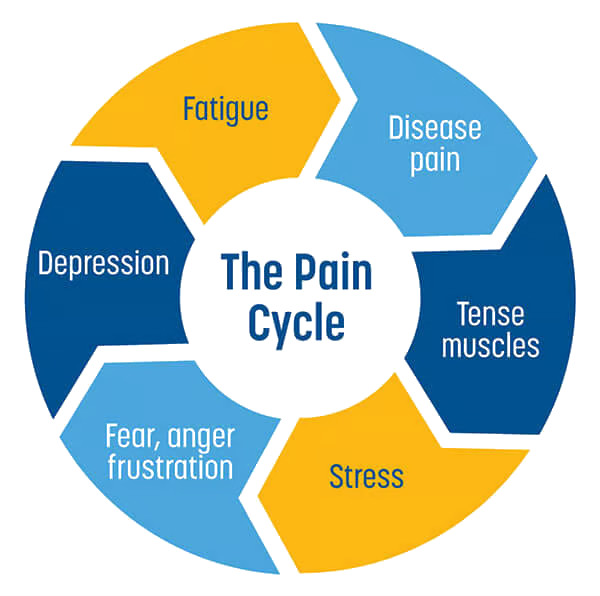
Pivotal Role of Psychiatry in Workers’ Compensation
Mental health treatment accelerates recovery, shortens claims, and supports safe return to work.
Recovery Is More Than Physical
Workplace injuries trigger both physical and emotional responses (stress, anxiety, or frustration) that can slow recovery and delay return to work.
Detailed psychiatric evaluations help identify and treat these factors early, improving both clinical and functional outcomes.
Identify barriers such as fear of re-injury, depression, and poor recovery expectations
Deliver evidence-based interventions that improve focus, motivation, and treatment participation
Early psychiatric involvement can shorten claim duration by 60–70%, helping patients return to work about two months sooner. (Source)
The Mind-Body Connection
Up to 40% of workers with physical injuries develop anxiety or depression, which can slow healing and prolong disability.
The Pain Cycle helps explain why chronic pain increases stress, amplifies fatigue, and creating a reinforcing loop of pain and depression.
Through early evaluation and targeted therapy, psychiatric care helps interrupt this cycle by addressing the psychological drivers of prolonged physical symptoms, supporting both emotional stability and pain control.
Early psychiatric evaluation identifies:
Fear of re-injury and avoidance behavior
Catastrophizing (expecting the worst)
Low recovery confidence or frustration
Sleep disturbance and fatigue
Treating these factors reduces pain sensitivity, improves rehabilitation participation, and restores function—building the foundation for sustained recovery and safe return to work
Explore professionally curated insights by Dr. Vijapura himself on early intervention in our Blog
Psychiatry Assists Whole Person Integrated Care
Recovery involves the entire body system including the brain, nervous system, and physical healing all work together.
Psychiatric care supports the whole-person model by identifying and addressing the psychological factors that influence physical healing.
Reducing emotional strain improves sleep, focus, and participation in rehabilitation. Incorporating both Psychiatry and a healthy balance of Cognitive Behavioral Therapy (CBT) leads to faster, more complete outcomes. This collaboration between psychiatry, medicine, and rehabilitation strengthens both mental stability and functional recovery, leading to faster and more complete outcomes.
Whole-person recovery starts with treating both body and mind.
Learn about our personalized support to improve return-to-work readiness on the Approach Page.
Timely Intervention Reduces Costs
The first few weeks after an injury often set the tone for recovery. Delays in recognizing psychological stress, anxiety, or fear of re-injury can allow pain to intensify and functional progress to slow.
Timely psychiatric evaluation helps identify these barriers early before they become chronic and provide patients with tools to manage pain, improve focus, and re-engage in rehabilitation.
To facilitate timely intervention, our clinic offers statewide access through secure virtual care, ensuring injured workers receive prompt, evidence-based support wherever they are. This early alignment between physical and psychological treatment promotes faster recovery, stronger participation, and smoother coordination for all stakeholders.
-
75% ⬆ in cost
Due to unaddressed behavioral health challenges, prolonging a worker’s recovery and increase workplace injury costs
Source: American Hospital Association -
Key Barrier
Claims professionals repeatedly cite untreated behavioral health as a primary obstacle to optimal claim outcome
Source: Rising Medical Solutions -
Avoid Chronic Disability
Timely intervention can be the difference between short-term recovery and chronic disability.
Source: Risk and Insurance
Florida Occupational Psychiatry is here to help







